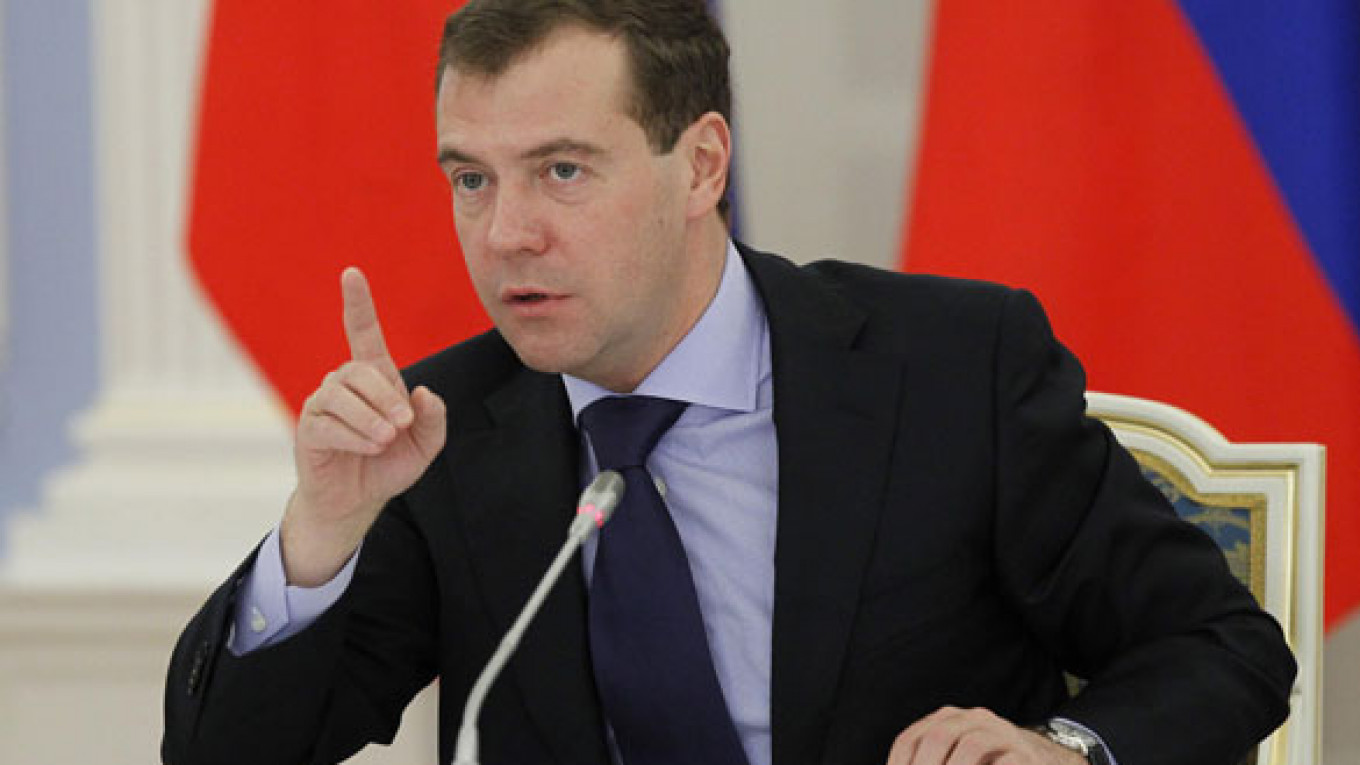President Dmitry Medvedev proposed tax breaks for individuals who invest in innovation companies and asked for improvements to immigration rules to ease mobility for foreigners during the modernization commission meeting Monday at his Gorki residence.
“We could look into the possibility of a tax exemption for [business angels] on the income tax that results from the sale of shares of innovative companies,” Medvedev said, referring to private individuals who invest in startups in exchange for a stake in the new ventures, Interfax reported.
The legislative base for such tax breaks is already in a bill currently being reviewed by the State Duma, Medvedev said.
Medvedev's comments are in line with the Kremlin's campaign to court foreign investors, get attention to the Skolkovo technology hub, and the country's modernization effort, which was rolled out with a renewed zeal after the president's visit to the U.S. this summer.
The president also expressed concern over one aspect of immigration law that he views as a nuisance for the highly skilled foreign specialists he hopes will flock to Skolkovo.
Foreign specialists who work in Russia are only allowed to spend 10 days a year on business trips, according to the current legislation, he said.
“I honestly did not know about this norm,” Medvedev said, calling this part of the law “something from the regulations of the Soviet times.”
“Any foreigner thereafter is assumed to be a person who has come to Russia only for one thing — to collect information,” Medvedev said facetiously. “So the less he travels around the country, the better it is for our country. Even better if he just sits in one place. Better yet, let him not come at all, less fuss for law enforcement and the special forces. This needs to change.”
Experts say this part of immigration law is not that significant.
“This clause is not that big of a hindrance,” Yekaterina Gorokhova, vice president and general manager at staffing agency Kelly Services CIS, told The Moscow Times.
“If a foreign specialist has the need for business travel stated in his contract, he may be out on business trips for longer than 10 days,” she said. “Not only that, but for highly qualified specialists who come to work in Russia there are separate requirements that govern their stay in the country.”
The president also bemoaned legislation that governs state purchasing, saying that nearly everyone is fed up with it, and it facilitates even more kick-backs than before.
Medvedev highlighted that the current rules allow for simple purchases, but the state suffers losses in time and money when it comes to acquiring technically complex or unique products.
The president complained about the current state of customs control over imports of prototypes, demo equipment and lab samples essential to innovation projects. He said it is necessary to change current technical regulations and simplify the requirements for new products, recognizing the validity of the European certification processes, Interfax reported.
Economic Development Minister Elvira Nabiullina suggested an “intellectual amnesty” for inventions made using federal funding.
“We still do not have an established mechanism of transferring the rights … of intellectual property to the most effective proprietor who is ready and willing to commercialize [it],” she said at the modernization commission session.
The government finances about 60 percent of research and development centers, the minister estimated, but has no clear mechanism for the intellectual property rights transfer, so the government will see no adequate return on its investment, Nabiullina said.
“I suggest we make a decision to immediately privatize intellectual assets … carry out intellectual amnesty for assets created with the use of budget funding,” Nabiullina said. She proposed a process by which the government would review all intellectual assets created using budget funds, keep the rights to some for itself, and offer the rest first to the inventors and, if they were not interested, to anyone who would commit to commercializing the inventions.
The economic development minister expounded on the idea of promoting business at a conference late last week entitled, “Competition in Russia: How to Create a Favorable Climate for Business Development?”
“Public demand for competition in Russia is still weak. The way to success for business should lie through competition for the consumer, and not the way it is happening now — through competition for access to officials' offices,” Nabiullina said at the conference.
A Message from The Moscow Times:
Dear readers,
We are facing unprecedented challenges. Russia's Prosecutor General's Office has designated The Moscow Times as an "undesirable" organization, criminalizing our work and putting our staff at risk of prosecution. This follows our earlier unjust labeling as a "foreign agent."
These actions are direct attempts to silence independent journalism in Russia. The authorities claim our work "discredits the decisions of the Russian leadership." We see things differently: we strive to provide accurate, unbiased reporting on Russia.
We, the journalists of The Moscow Times, refuse to be silenced. But to continue our work, we need your help.
Your support, no matter how small, makes a world of difference. If you can, please support us monthly starting from just $2. It's quick to set up, and every contribution makes a significant impact.
By supporting The Moscow Times, you're defending open, independent journalism in the face of repression. Thank you for standing with us.
Remind me later.






